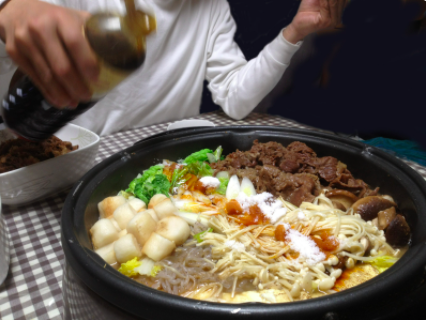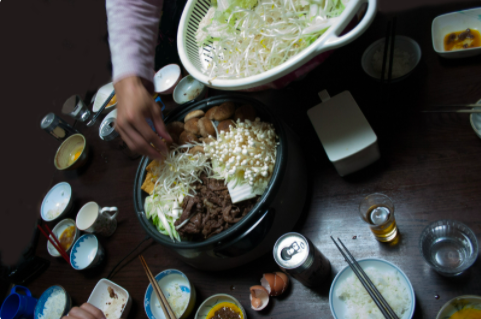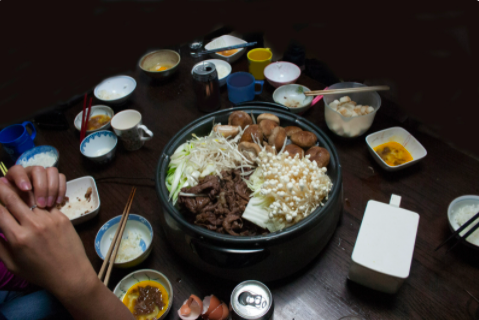Sukiyaki, sorrows, sweetness

INQUIRER.net stock image
“Wait, so, ano dinner natin mamaya?” I asked my mother. We were at the grocery store, stocking up our pantry, which we last shopped for two months ago. She looked at me, just looked. We have not bought anything yet for dinner later.
We were already in line when my mother thought of buying ground beef that we could have for lunch this week. I felt responsible for the dinner.
Sukiyaki, I thought. “Kelan tayo huling nag-sukiyaki?” I asked Ate Ruth, our family helper for almost 20 years, who was with us there at the store.
“Matagal na,” she replied.
I ran to my mom and said we should have sukiyaki for dinner. She was in line for ground beef as she said, “Pork and beef strips, okay na yun? Mahal kasi ng baka, eh.” I nodded as I looked at the cuts of meat.
“Okay, ikaw kumuha ng mga gulay, alam mo naman yun ‘di ba?” her voice becoming softer as I was already on my way to get them.
* * *
Sukiyaki is Japan’s version of a hot pot. Its broth tastes of soy sauce, mirin and sugar. Thin slices of beef and long glass noodles simmer inside a pot of sukiyaki, along with tofu and vegetables like mushrooms, onions and pechay.
I’ve read that these are dipped in raw egg before being added to the soup, but my family adds the soup to the eggs just before eating.
I’ve also read that sukiyaki is generally a winter dish, yet I’ve only ever had it twice during winters.
* * *
My aunt, who I call Ninang Billie, lived in Canada for most of her life, migrating in the early 2000s. She never had kids but she loved them. She helped my mother plan my baptism and my first birthday. She picked me up from school and carried me around her lunches. She presented herself as another mother to me, and at four years old, I enjoyed the company.
When my family first visited her in Canada in December of 2018, she had been in remission for lymphoma, or cancer of the lymph nodes, for a few months. We figured that it was a golden opportunity to spend the holidays as a whole family again, as we had not been “whole” for over a while. And with her recovery, there was a cause for celebration.

INQUIRER.net stock photo
She lived in Canada with her husband, whom we call Tito EE. During our trip, they showed us all of their favorite eating spots, but they also showed us what they loved eating together. My ninang’s sukiyaki, we found out, was her signature dish among her Fil-Can friends. It was the centerpiece of every party, especially on her birthday, which is in the beginning of winter.
She cooked it so often that she invested in a Saladmaster wok. My ninang, for the most part, was frugal — I know why she did not disclose how much it cost her.
I had my first taste of sukiyaki in the winter when my Ninang Billie made it for a small gathering we had with her friends. The broth was clear but sharp, and each sip made the -20 degree weather bearable. The vegetables were neatly arranged, and there were enough beef strips for everyone. I listened as her friends raved about her soup and when they first tried it. They have not stopped requesting it since, they said.
A taste of her sukiyaki, I realized, was a rite of passage. Her love is a soft, intimate whisper — you’ll miss it if you don’t listen. When she serves you her sukiyaki, she means to say, “Welcome to the family. Eat like us now.”
* * *
I don’t know if my ninang’s sukiyaki was as good as or better than her mother’s (or my grandmother’s, Lola Baby’s). All I know is that my ninang uses my lola’s recipe, and that we still have a handwritten copy of it today in a box somewhere in our kitchen. I know that I first had it on a Sunday, because we visited Lola Baby during Sundays, and that once I entered her home, she’d have stacks of cookies waiting for me — some she had baked earlier in the week or just that morning.
I know that I have not had my Lola Baby’s sukiyaki for a decade, since my lola passed away in 2011. I know that my Ninang Billie could not go to her own mother’s funeral because she was in Canada, recovering from a surgery, and because she already booked flights for later that year.
I know that when ninang came home in 2011, I didn’t see her cry, but I saw her scour through my grandmother’s recipes for ones she can bring back to Canada with her. I know that she did this a few times.
My grandmother died on a Monday. Two days after my father’s birthday. We had our last dinner with her that Sunday night. It was a late celebration for my dad, who was my lola’s favorite.
I don’t know if she cooked her sukiyaki with all of us in mind, but I know that she kept our Sundays sacred by bringing out a hot pot of beef strips and vegetables. Japanese food was her favorite’s favorite, after all.
* * *
The year after we visited my Ninang Billie for the holidays in Canada, we received news that her cancer was back. We had booked flights to Japan, the birthplace of sukiyaki, with the hopes of her coming with us. It was going to be a five-day trip from October to November.
My ninang’s cancer turned terminal while my dad, mom, brother and I were in Japan. She did not tell us until we got back from our trip. My dad, only a year younger than his sister, was devastated. I flew with him back to Canada. It was winter again, but the moment we landed, we knew that Canada harbored a different kind of cold.
We took care of my Ninang Billie for a week before she passed away. Two days before her birthday.
The night she died, we went to a gloomy lit diner, and we toasted her life. Her husband told my dad and I that we were going to see the group of friends we met a year prior. They wanted the sukiyaki, and my ninang wasn’t the only one with the recipe — my dad, too, had it.

INQUIRER.net stock photo
My dad, Beaujet (pronounced Bo-jet), and Ninang Billie were like twins from a sitcom. They always had each other’s backs, but always needed back-ups for different reasons. My dad was temperamental, and he needed my ninang to sort him out. My ninang was too serious, and needed my dad to bring her back down.
He made the sukiyaki using her Saladmaster wok for the first time — my ninang left it with him. It was a large 7-quart wok, metallic, polished and barely used, or at least it seemed so. It’s supposed to be a high-quality wok after all.
It was winter again and everything was different, but the sukiyaki tasted the same.
I think the best meals are those that shut you up. We did not toast to Ninang Billie that night. We ate for her.
* * *
My dad always said that my lola had a “flavor of the month,” that when she found out you liked something she cooked, she’ll keep making it for you until you get tired of it. This is true. It happened to me with lengua estofado and buttered noodles.
Ninang Billie had the same love language. When she found out my mother liked strawberries, she bought two boxes of strawberries every time we went to the grocery store, which would be every other day.
Dad would never admit how similar he is to his mother, which is a story for another time, but I knew he did this too. Years after my ninang passed, we had sukiyaki for what felt like every other week. I wondered how it tastes to him. I watched his confidence when he made the broth, and when he asked us for our bowls, and served us our first heaping.
I think about the broth that has outlived my grandmother and my aunt, the beef strips that nourished my and my brother’s muscles since then. I fear that the broth is slipping away from my consciousness, faster than I slurp it down. In my head, I see my dad when he made it, how he sipped the soup a few times before adding soy sauce or mirin or sugar again. He’s unsure but he can’t be. He fixes the broth again.
I’d never admit how similar I am to my father, but I know that after his passing away — on his birthday — I started doing the same thing.
* * *
I had watched that wok go from storage to shelf to stove to storage again.
One Friday night, Ate Ruth recalled a dream she had about my dad. She begged him to come back “dahil mahirap mag-isip ng ulam.” Whenever I hear that he visits people’s dreams, I no longer question the validity. The hurt part of me wishes it is indeed him they see, and the hardened part of me knows that dreams are dreams and that we do what we want with them.
We were at our dinner table and all of us — my mom, brother and Ate Ruth — fell silent, as if in reverence to my dad. My mom, who often complains about dad never showing up in her dreams, smiled and continued eating.
I just laughed and changed the topic: “Tuloy ba tayo sa grocery bukas?”
_
Samantha Louise M. Mayoralgo is an entertainment and features writer for INQUIRER.net. Sam to her family and friends, she loves baking, writing, and writing about baking. She also enjoys the company of her 5-year-old dog Yubyub, and enjoys watching the vlogbrothers and BTS (especially Jungkook).
RELATED STORIES:

Image: INQUIRER.net/Marie Faro




















